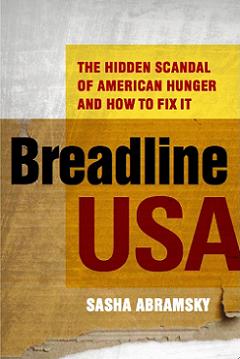 My friend Sasha Abramsky has just come out with a book about hunger in the United States, called Breadline USA: The Hidden Scandal of American Hunger and How to Fix It. I picked up a copy yesterday, and while I’m only about 50 pages into it so far, I can already highly recommend it to anyone interested in “food insecurity” (to use a current buzzword) and the myriad ways that increasing inequality has bred increasing hardship in modern society.
My friend Sasha Abramsky has just come out with a book about hunger in the United States, called Breadline USA: The Hidden Scandal of American Hunger and How to Fix It. I picked up a copy yesterday, and while I’m only about 50 pages into it so far, I can already highly recommend it to anyone interested in “food insecurity” (to use a current buzzword) and the myriad ways that increasing inequality has bred increasing hardship in modern society.
There have been a number of worthy and well-known books about American food culture in recent years, such as Eric Schlosser’s Fast Food Nation and Michael Pollan’s The Omnivore’s Dilemma, and those two in particular were revelatory to many of us in their own ways. Those books, however, tend to focus on the perverse consequences, both social and medical, of an abundance of cheap calories, due to corn-based industrial agriculture, fast food chains, and so on.
That’s an important story, to be sure, but Sasha’s book addresses the flip side of our food problem, which is not a surplus of affordable food, but a deficit, and the fact that growing numbers of Americans—including people with full-time jobs—struggle to feed themselves and their families. As housing costs, medical costs, transportation costs, and food costs increase, while wages stagnate (or vanish altogether as jobs are lost), more and more people are forced to choose between medicine and protein, or between paying for their housing or paying for their dinner.
To say that Breadline USA is about food is like saying that Anna Karenina is about adultery: while food insecurity is the thread that stitches the book together, one can’t discuss hunger without delving into the larger economic forces that have put us in a situation where people working full-time at low-wage jobs often rely on food banks to keep their refrigerators minimally stocked. It’s no fluke that the first chapter is more about energy costs than food, describing the difficulties faced by residents of rural Siskiyou County, in the shadow of Mount Shasta, as transportation costs rise, public transportation is skeletal at best, and jobs in one’s own town are often nonexistent. Food banks, pantries, and soup kitchens these days don’t only serve the homeless or the unemployed—more and more, they are the last resort of the working poor, retirees, or others who had previously prided themselves on never having had to accept a handout from anyone.
The book is a compelling mixture of on-the-ground reportage backed up with data and policy discussion, interspersed with personal narrative—a combination that will be familiar to anyone who has read Sasha’s earlier books on the criminal justice system or voting rights. The bulk of the reporting for the book was done before the implosion of the housing bubble caused our house-of-cards economic system to teeter so frighteningly, and it’s safe to say that the hardships faced by the poor and the lower middle class are now much more dire than they were when the book went to press, as jobs continue to disappear and government safety nets fray. You can get a taste of what Breadline USA is all about by listening to Sasha’s interview at Truthdig or reading some of the articles at his website or for the Guardian newspaper (California readers may be interested in his Guardian articles on our state’s economic problems as well).
9 Comments